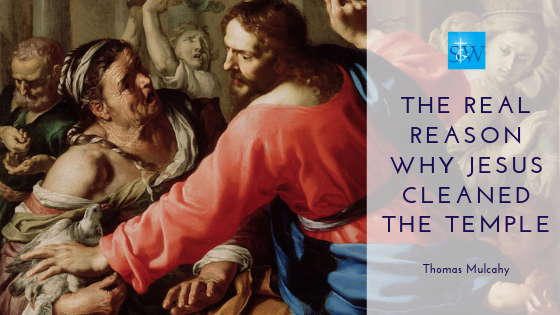“On reaching Jerusalem, Jesus entered the temple area and began driving out those who were buying and selling there. He overturned the tables of the money changers and the benches of those selling doves, and would not allow anyone to carry merchandise through the temple courts. And as he taught them, he said, “Is it not written: `My house will be called a house of prayer for all nations’? But you have made it `a den of robbers.’” The chief priests and the teachers of the law heard this and began looking for a way to kill him, for they feared him, because the whole crowd was amazed at his teaching.” (Mark 11:15-18).
Jesus’ cleansing of the Temple in Jerusalem is one of the most fascinating aspects of his life and personality. It is a story which grabs our attention, and makes us think that perhaps, on this one occasion, Jesus went a little too far. The story, in fact, has a much deeper dimension than whether Jesus got a little too angry. The story speaks to a more dramatic cleansing: the doom of the Temple and the whole Old Testament economy.
Mark’s Gospel, often purported by some scholars to be less concerned with Jesus’ Divinity, actually shows us three startling instances where Jesus exercised his Divine authority and Lordship. These are:
1. Jesus’ Lordship Over the Sabbath (see Mark 3:28)
2. Jesus’ Lordship Over Marriage and Divorce (see Mark 10: 6-12)
3. Jesus’ Lordship Over the Temple (see Mark 11: 15-18 and 13: 1-37)
So what’s going on with Jesus and the money-changers in the Temple? Is Jesus simply ticked off that there is commerce going on in the Temple? Or is there a far deeper concern on the mind of Jesus?
The Scriptures had foretold that one day God would gather Jew and Gentile to worship together at the Temple (see Isaiah 56: 7). Moreover, the Scriptures also foretold (at least typologically) of a day when the Messiah would make a “divine inspection” of the Temple (see Mal. 3: 1-4). When this day arrives for the inspection, Jesus says:
“Is it not written: ‘My house will be called a house of prayer for all nations’? But you have made it ‘a den of robbers’” (Mark 11: 17). The Temple’s outer court, where the buying and selling took place, was supposed to be a place of prayer and worship for the Gentiles. This story isn’t just about money; its about salvation. Turning the outer court of the Temple into a market place effectively impeded God’s plan of salvation for the Gentiles. Thus we read the following in the commentary of the Ignatius Catholic Study Bible:
“Because Israel failed to repent, Solomon’s Temple [the first Temple] was destroyed by the Babylonians in 586 B.C. Jesus similarly confronts Israelites who presume their covenant relationship with God will remain secure despite their sin….Their impenitence will result in the Temple’s second destruction in A.D. 70 [by Roman armies]. *** Here too the mountain of Jerusalem and its Temple must be pushed aside to make room for a new Temple: the true house of prayer built of Christian believers quarried from all nations….” (Gospel of Mark, Chapter 11 footnotes)
Jesus’ cleansing of the Temple foretells its doom. “Jesus’ dramatic demonstration of overturning tables foreshadows the Temple’s violent destruction in A.D. 70.” Jesus wasn’t just overturning tables in the Temple; he was overturning the whole Old Testament economy. New wine cannot be placed into old wine skins. Jesus himself will be the new, indestructible Temple. In Chapter 13 of Mark’s Gospel Jesus will foretell with remarkable accuracy the destruction of the Jerusalem Temple which occurred less than four decades after His death and resurrection (see Reference below).
PRESENT DAY APPLICATION:
Is the Church today more concerned with the spirit of the world than with the salvation of souls, thus impeding its primary mission as a soul-saving institution? Peter Herbeck (of Renewal Ministries) mentioned in a recent newsletter that the Church is already undergoing a painful purification in regards to the clergy sex abuse crisis. The great Catholic philosopher, Dietrich von Hildebrand, commented long ago that there was a morality crisis infecting the Church in a most dangerous manner. I therefore end this note with an edited quote from his book, Trojan Horse in the City of God:
“ONE OF THE MOST OMINOUS symptoms of decay in the Church today is the acceptance of modern amoralism. One could observe many amoralistic trends creeping into sermons years before Vatican II. The amoralism gaining currency among Catholics is indeed one of the most alarming symptoms of a loss of authentic Christian faith. Goods such as the earthly welfare of mankind, scientific progress, and the domination of the forces of nature are…considered much more important than moral perfection and the avoidance of sin….
He who is more impressed and thrilled by ‘cosmic processes’ and the speculation of science than by reflections on Christ’s humanity in a saint and by the victory over the world that the very existence of a saint embodies, is no longer filled with the Christian spirit. He who cares more for the earthly welfare of humanity than for its sanctification has lost the Christian view of the universe.”
Tom Mulcahy, M.A.
Reference: I am relying entirely on the notes in the Ignatius Catholic Study Bible for The Gospel of Mark.

